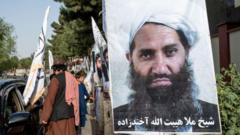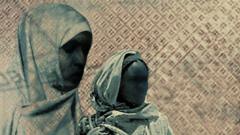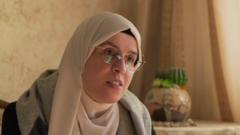The International Criminal Court (ICC) is moving forward with seeking arrest warrants for Taliban leaders over human rights violations against women and girls in Afghanistan.
ICC Seeks Arrest of Taliban Leaders for Persecuting Afghan Women and Girls

ICC Seeks Arrest of Taliban Leaders for Persecuting Afghan Women and Girls
International Criminal Court's prosecutor calls for action against Taliban's gender-based crimes.
The chief prosecutor of the ICC, Karim Khan, announced plans to pursue arrest warrants for high-ranking Taliban officials, citing strong evidence of their involvement in crimes against humanity targeting women and girls. Khan indicated that he suspects Supreme Leader Haibatullah Akhundzada and Chief Justice Abdul Hakim Haqqani are criminally liable for the systematic persecution of individuals deemed to defy the Taliban’s rigid gender norms.
The ICC's next step involves judges determining whether they will approve the requested arrest warrants. This move comes in light of the court’s mission to hold accountable those committing egregious acts such as genocide, war crimes, and crimes against humanity. In his statement, Khan emphasized that these officials face allegations of committing severe human rights abuses, including murder, imprisonment, and torture against Afghan girls and women, as well as any individuals perceived as allies to these groups, since the Taliban’s resurgence on August 15, 2021.
Akhundzada has been at the helm of the Taliban leadership since 2016 and has played a significant role in establishing the so-called Islamic Emirate of Afghanistan. Meanwhile, Haqqani has longstanding ties to the Taliban, having been involved in key negotiations with the U.S. in previous years.
Since the Taliban's return to power, women and girls in Afghanistan have witnessed a drastic rollback of their rights, stripped of access to secondary and higher education, and subjected to numerous restrictions including work bans, fashion codes enforcing full-body coverings, and prohibitions on public spaces without male guardians. The group continues to enforce "morality laws" that have left Afghan women increasingly marginalized and oppressed within their own society.
Recent educational bans, such as those preventing women from training as midwives or nurses, only further illustrate the systematic dismantling of women's rights under Taliban rule, prompting international calls for justice and accountability.
The Taliban has yet to issue a response to the ICC's recent statements amid growing global scrutiny of its treatment of women.
Afghanistan, once again at the center of controversy, faces a pressing need for international attention on the plight of its women.
Taliban, ICC, Human Rights, Women's Rights, Afghanistan
The ICC's next step involves judges determining whether they will approve the requested arrest warrants. This move comes in light of the court’s mission to hold accountable those committing egregious acts such as genocide, war crimes, and crimes against humanity. In his statement, Khan emphasized that these officials face allegations of committing severe human rights abuses, including murder, imprisonment, and torture against Afghan girls and women, as well as any individuals perceived as allies to these groups, since the Taliban’s resurgence on August 15, 2021.
Akhundzada has been at the helm of the Taliban leadership since 2016 and has played a significant role in establishing the so-called Islamic Emirate of Afghanistan. Meanwhile, Haqqani has longstanding ties to the Taliban, having been involved in key negotiations with the U.S. in previous years.
Since the Taliban's return to power, women and girls in Afghanistan have witnessed a drastic rollback of their rights, stripped of access to secondary and higher education, and subjected to numerous restrictions including work bans, fashion codes enforcing full-body coverings, and prohibitions on public spaces without male guardians. The group continues to enforce "morality laws" that have left Afghan women increasingly marginalized and oppressed within their own society.
Recent educational bans, such as those preventing women from training as midwives or nurses, only further illustrate the systematic dismantling of women's rights under Taliban rule, prompting international calls for justice and accountability.
The Taliban has yet to issue a response to the ICC's recent statements amid growing global scrutiny of its treatment of women.
Afghanistan, once again at the center of controversy, faces a pressing need for international attention on the plight of its women.
Taliban, ICC, Human Rights, Women's Rights, Afghanistan



















